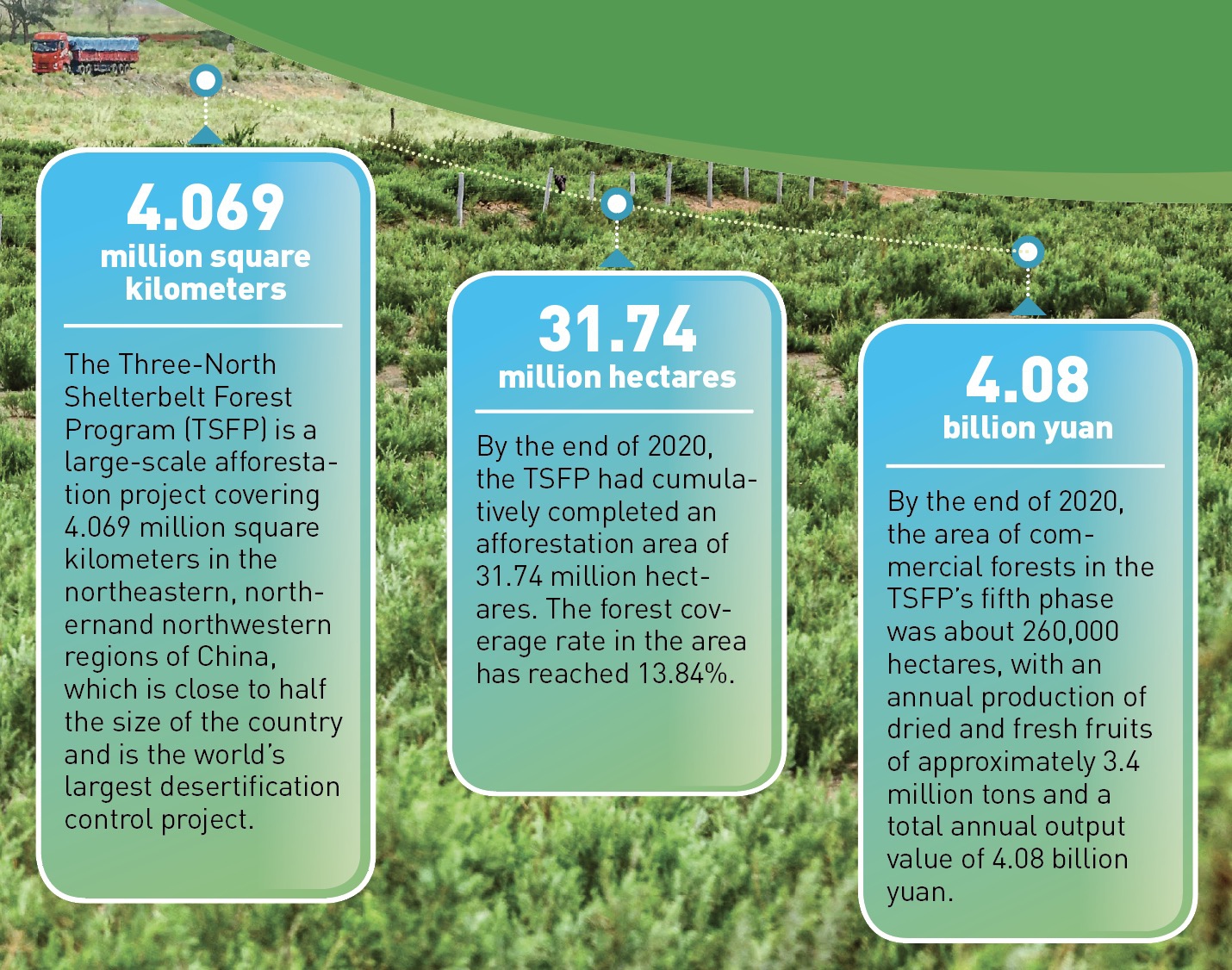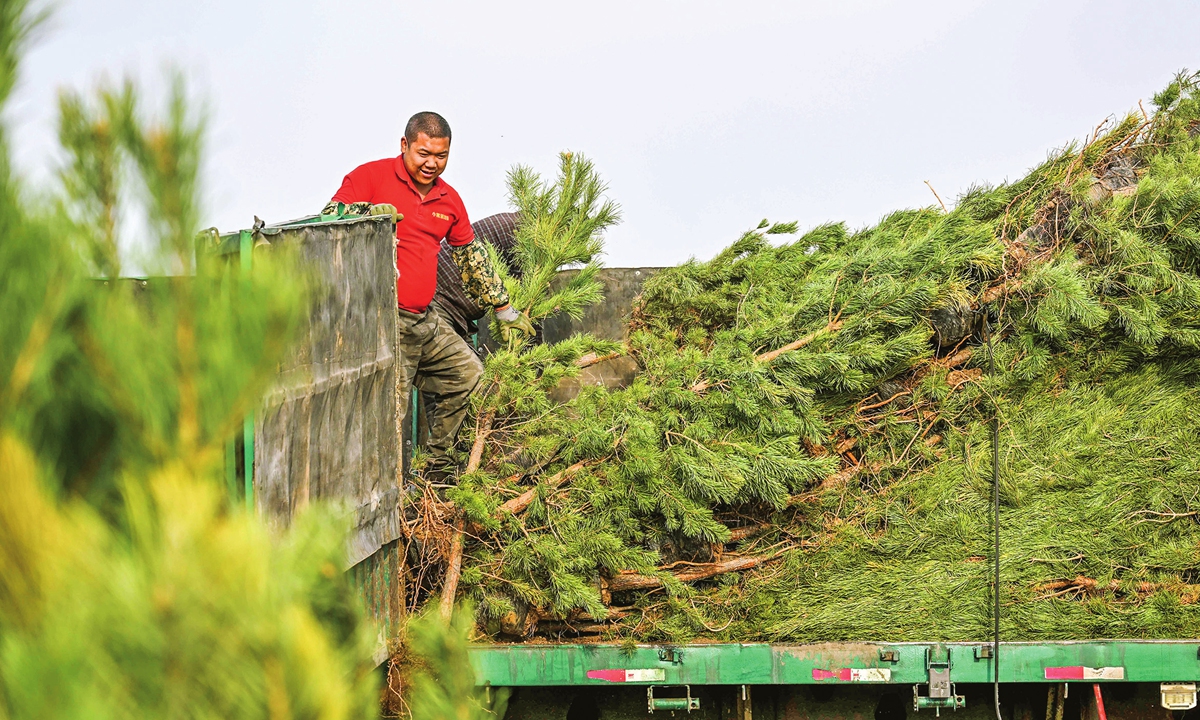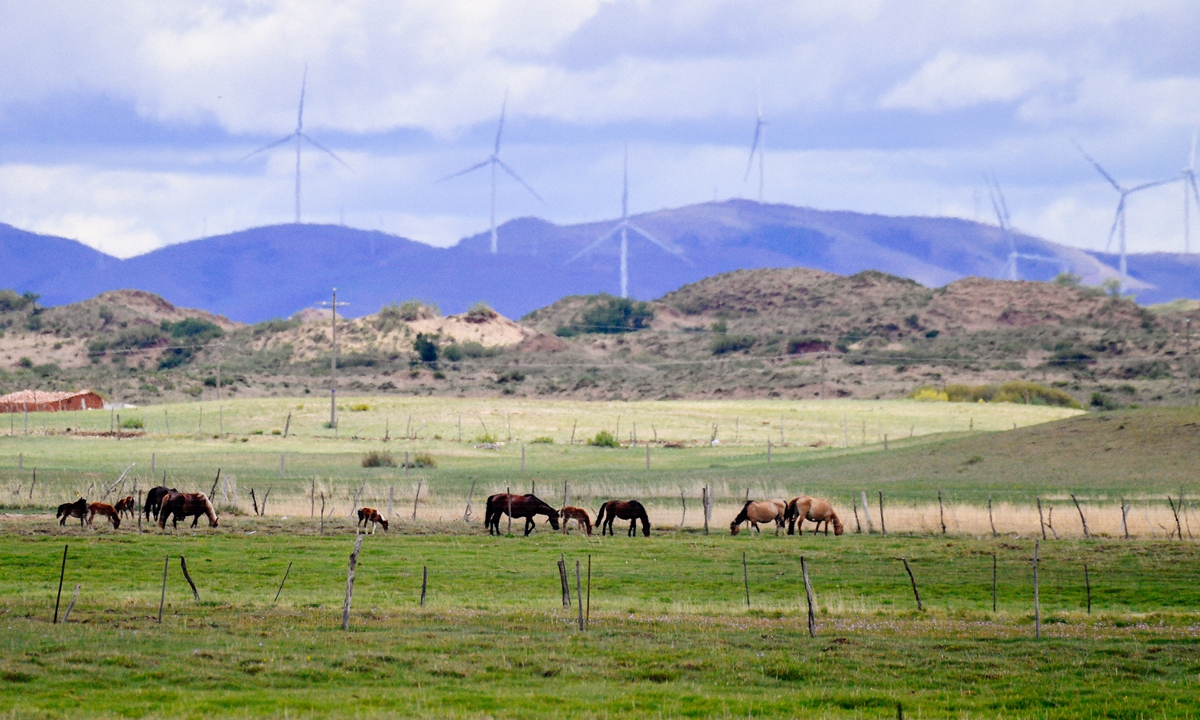In early summer, the state-owned Xinhua forest farm in Linhe district, Bayannur, North China’s Inner Mongolia Autonomous Region, is lush with greenery, casting a shade on the sand.
These seemingly ordinary trees have been gazed upon by Xi Jinping, general secretary of the Communist Party of China (CPC) Central Committee, Chinese President and chairman of the Central Military Commission, for a long time.
On June 6, Xi went to the Xinhua forest farm, where he learned about the development of the Three-North Shelterbelt Forest Program (TSFP).
After over 40 years of unremitting efforts, China has made remarkable achievements in preventing and controlling desertification, and realized a historic transformation from “sand forcing humans to retreat” to “trees forcing sand to retreat” in key areas, Xi said at a symposium during his inspection.
China, as a populous country with a 5,000-year history, is one of the countries that are most severely affected by desertification. Fortunately, “greenery” has become a common sight in China’s desert areas in the recent past.
In 1978, the Chinese government made a significant decision to build the TSFP to slow down desertification and improve the ecological environment, which opened the largest artificial ecological forest belt construction in human history.

Graphic: GT
Desertification has been reduced, the damage caused by wind, sand and soil erosion has been effectively curbed, the legal system for preventing and controlling desertification has been increasingly improved, and remarkable results have been achieved for the benefit of the people. This combination of efforts has created the “spirit of Three-North” and set an international example for ecological governance, Xi said.
Looking back at the four-decade-long struggle between China and the desert, the Chinese people increasingly understand the significance of this example meaning: Countless afforestation and sand control movements have persisted in combining government leadership with public participation, hard work with scientific adherence, and ecological governance with improving people’s livelihoods.
Countless ordinary Chinese farmers, grassroots government officials, and ecologists have been working tirelessly for decades in desert areas, as they believe that the desert holds the key to ecological governance and poverty alleviation. They also believe that one day, China will confidently participate in the global efforts of controlling desertification with scientific solutions for sand management with Chinese characteristics.
Historical vision

A sand control worker transports saplings at the Horqin Zuoyi Rear Banner, Inner Mongolia Autonomous region, on April 15, 2023. Photo: Xinhua
These days, Xinhua forest farm is a hive of activity with the forestry workers happily performing their tasks.
Xi’s concern for the plants in the forest, and his words of encouragement for the cause of sand control, motivated those who were present for the president’s visit.
“The achievements of our struggle over the past decades can be reviewed by President Xi, which is an affirmation of our work, and it is our pride to turn the sandy, barren waste and salt marsh into woodland and fertile fields,” Du Wenhua, head of the Xinhua forest farm, told the Global Times.
The Xinhua forest farm was established in 1960. “In the 1970s, during spring and autumn, sandstorms would fill the sky and bury newly sprouted crops. It would take three or four attempts to successfully grow crops,” recalled Du.
Located in the hinterland of the Hetao Plain, the forest farm is an important grain and oil production base in China. “In order to protect farmland, it is necessary to control sand,” Du pointed out.
A 20-meter-tall poplar tree in the farm is Du’s “old friend” as it was planted in 1978, the year when the TSFP initiated.
In that year, with project support and state investment, the forest farm started to introduce excellent tree species from abroad and carry out large-scale afforestation and sand control in combination with local species.Under the successive struggles of three generations of foresters, a total of 39,000 mu (about 2,600 hectares) of forestation was carried out, 4.3 million trees were planted, and the area of sand shrunk from 21,500 mu in the 1960s to 0.5 million mu. The forest coverage rate increased from 25.6 percent in 2012 to 65 percent today, the Global Times learned from publicity department authority of the Inner Mongolia Autonomous Region.
Now, clusters of white flowers can be seen in the forest farm. That’s the sophora alopecuroides, Du introduced. “Farmers often say ‘where the sophora alopecuroides grow, you can open up the land to grow crops,’ which reflects that the soil conditions in our farm have been greatly improved.”
Du noted that at present, the focus of forest farm employees has shifted from afforestation to forest tree care and management, and their income is gained in various ways such as seedling rearing, forest tree protection, and seed breeding, so as to achieve the sustainable and high-quality development of forest farms.
The Xinhua forest farm is a vivid portrayal of desertification control and afforestation in China. There are 292 state-owned forest farms like this in Inner Mongolia. From 1978 to 2020, the region has completed 119 million mu of the TSFP construction tasks, accounting for 25.1 percent of the country’s efforts.
Recently, the Xinhua forest farm and the Desert Forestry Experimental Center of the Chinese Academy of Forestry signed a comprehensive strategic cooperation agreement to jointly build a demonstration forest farm to jointly strengthen the comprehensive prevention and control of desertification, and promote the construction of TSFP.
The TSFP, which stretches for more than 4,400 kilometers from east to west, was launched in 1978 when the curtain of reform and opening-up was lift, and the CPC set its sights on the year 2050 for this project. This demonstrates the Party’s strategic foresight and historical vision, Du said.
“We foresters will continue to work hard to build a more unbreakable ‘Great Green Wall’ and ecological security barrier in northern China,”Du said, in a firm voice.
Lovely ‘fools’ in desert
If you were to paint a portrait of the people living in China’s desert regions, it would undoubtedly include elements such as tanned skin, rough hands, and a stubborn determination to challenge the desert. Baoxiulan, the deputy Party secretary of Baotou village in Naiman Banner, Inner Mongolia Autonomous Region, fits all of these characteristics.
“I would rather die in planting trees than let the sand bully us to death!” The 50-year-old Mongolian told the Global Times.
Since she was 23, Baoxiulan has been planting trees in the desert. Today, she has led villagers to plant over 3 million trees on a total area of 29,000 mu.
“In the past, we had to find our house in the sand; now, our house is located deep in the oasis,” she said proudly.
In 1993, after getting married, Baoxiulan moved to Baotou village located on the northern part of the village which itself traverses a large python-like desert, and there the wind rages all year round. There were only a few dozen old elm and willow trees that had survived over the years. Faced with such a harsh living environment, Baoxiulan conceived the idea of planting trees to prevent sand erosion.
She used money earned from selling cattle to buy 1200 poplar saplings and planted them in front of her house, and due to good rainfall that year, the survival rate of the saplings was more than 90 percent, which gave Baoxiulan the firm determination and confidence to control the sand.
In 1995, Baoxiulan contracted 2,500 acres of sandy land. During the initial planting days, Baoxiulan and her husband were seen as “fools” by the villagers: They sat on sand mounds every day, eating dry food and drinking cold water in the wilderness, to prevent the saplings from being eaten by grazing cattle. When the planted saplings were buried under sand by gusts of wind, they dug them out and replanted them. They persisted day after day until 2005, when the barren land finally turned green.
In the process of combating desertification, Baoxiulan became more deeply aware that in order to change the face of the home, it was not enough to rely on herself. Therefore, she went from house to house to guide the villagers on how to plant trees. Under her influence and encouragement, most people in Baotou village followed her example and planted trees, and the ecological environment of their hometown significantly improved.
Baoxiulan’s persistence for many years had made her a “silly woman” in the eyes of the villagers but she has since transformed into a recognized leader in wealth generation. As the sand dunes were increasingly covered with shoots, Baoxiulan was elected as Party secretary of her village in 2013.
Seizing the opportunity of the gradual increase of state subsidies for farmers and herdsmen, she shifted the focus of her work to increasing the income of villagers and led villagers to raise cattle on a large scale. By the end of 2019, all the 110,000 mu of the sandy area in Baotou village had been managed, the amount of livestock breeding had also increased 10-fold, with the per capita annual income of the village in the tens of thousands of yuan ($1400).
Baoxiulan firmly believed that a major ecological project such as the construction of TSFP can only be done under the leadership of the CPC. Under the leadership and call to action of the CPC, there are many such “fools” who have continued to work hard, and their efforts have yielded many harvests.
If the greenery in China’s deserts today could talk, it would be full of tales. From the early 1980s, six villagers in Gulang county, Northwest China’s Gansu Province, at the southern edge of the Tengger Desert, went into the desert to set up a collective forest and managed to transform 75,000 mu of quicksand in a decade. Wang Youde has spent 30 years leading workers in building a green barrier 47-kilometer-long from east to west and 38-kilometer-wide from north to south along the Mu Us Desert, effectively preventing the desert from encroaching further south or expanding westward.
“The people have actually seen the great changes in the land they lived on now enthusiastically participate in the action of afforestation, and support the great decision of the CPC to build the TSFP,” Baoxiulan said.
A constant source of fresh energy

The sandy hinterland of Xilin Gol League, Inner Mongolia Autonomous Region, where water and grass are plentiful and vibrant, on June 10, 2023. Photo: VCG
In the past, the older generation of planters in China tirelessly guarded the deserts, where vast expanses of “incurable” sand dunes finally gave way to hope through their efforts. This hope not only lies in the growth of saplings into trees, but also in the increasing number of knowledgeable young people to continue the efforts of the older generation in the desert, making the development of advanced desertification control technologies the main theme of their youth.
“I am a fourth-generation desertification control worker in the Kubuqi Desert. Fortunately, the 10 years I have worked in the desert coincide with China’s entry into the New Era, where ecological civilization construction has been placed at an unprecedentedly high level,” said Li Ting, technical manager of the Engineering and Technology Department of Elion Resources Group (Elion), told the Global Times.
In 2014, Li came to the Kubuqi Desert after graduating from university, and in 10 years, Li and his colleagues have carried out mapping work on more than 1 million mu of sand.
Cars have blown tires, people have rolled off dunes, and feet have suffered from an eruption of blisters… Li admitted that he has encountered a great number of difficulties while working in the desert in the past.
With the progress of science and technology, Li finally bid farewell to the era of mapping on foot. In 2017, the company purchased surveying drones, and since then, Li only needs to fly drones into the desert to complete the mapping work.
In the past, forestry workers described that “planting a tree need to bow three times.” Long-term bending in the sand to dig pits, plant trees, and water them has left many tree planters with waist pain, but today, with the continuous iteration of afforestation technology, such as drone planting, the ecological governance process has made remarkable strides forward, Li noted.
Thanks to the continuous efforts of the technicians, the survival rate of Li’s company’s tree planting has increased from 20 percent more than 30 years ago to 90 percent today, and the vegetation coverage of the Elion Resources Group’s contracted area in Kubuqi Desert has increased from less than 3 percent more than 30 years ago to 65 percent now.
“Workers should base their research on the realities of our country, turn the real knowledge acquired from practice into their theses, and become the true PhDs and experts that the Party and the people need,” Xi said during the inspection at the Xinhua forest farm.
Today, young people bring fresh energy to the Kubuqi Desert every year. These sand control professionals are setting up tents and doing experiments in the no-man’s land, learning from how the desert functions like the people in the sand area and combining theory with practice.
They are proud of the fact that every disappearing desert and every new oasis they witness is a link in the chain of destiny of the global village.
During the 2022 China-Arab States Summit, Elion signed a cooperation agreement with the Saudi Vegetation Development and Desertification Control Center to help Saudi Arabia plant 10 billion trees. Currently it is launching the cultivation of 100 million heat- and drought-tolerant saline-alkali seeds in Saudi Arabia. At the same time, Elion is actively exploring the promotion of the Kubuqi sand control model to Mongolia and other countries along the route of the Belt and Road Initiative, Li said.
Through decades of continuous efforts, several generations of young people in China have worked out a desertification control plan with Chinese characteristics that can be extended to the world. This plan has crossed continents and oceans, bringing confidence and well-being to people in countries and regions suffering from sandstorms.
The greenery in China’s deserts today is full of wonder and hope, Li believed that such wonderful stories and experience will spread all over the world in near the future.













